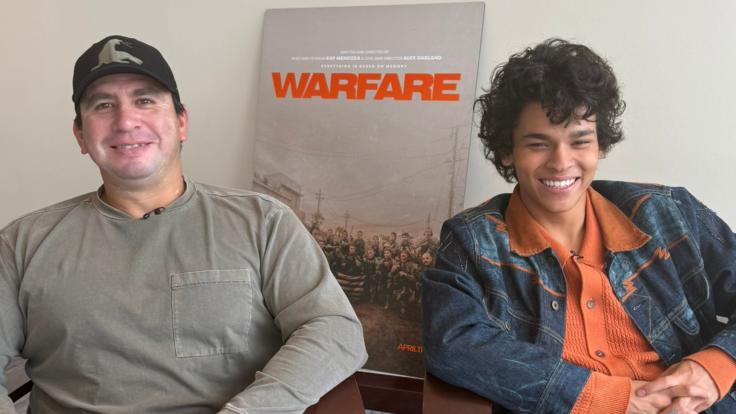
In 'Warfare,' a raw and emotionally charged war film co-directed by former Navy SEAL Ray Mendoza and filmmaker Alex Garland, the battlefield is only the beginning. The film, released by A24, reconstructs a 2006 mission in Ramadi, Iraq, in meticulous detail — not just as a cinematic feat, but as an act of remembrance, trauma recovery, and tribute.
For Mendoza, it's deeply personal. For D'Pharaoh Woon-A-Tai, the rising Canadian actor known for 'Reservation Dogs,' it's a performance rooted in reverence.
When I sat down with Mendoza and Woon-A-Tai in Miami after a screening that left me sleepless, the atmosphere was a mix of heaviness, awe and excitement.
"There's a lot of weight to carry"
Mendoza, the real-life SEAL whose experiences inspired the film, didn't initially watch 'Warfare' with his feelings in mind. "I didn't have emotions because I wanted all my friends to watch it and approve it," he explained. "These SEALs that were involved — their opinion matters a lot. I had to make sure I executed it right."
Instead of approaching the finished film as a detached creator, Mendoza experienced it through the reactions of the men he fought beside. Each approval became a weight lifted. "As I started to show each person that's portrayed in the film, it slowly started to get lighter and lighter. So I started to feel grateful and proud of them — helping these guys execute it."
The story centers on Mendoza's friend Elliott Miller, who suffered a traumatic brain injury during the mission and lost all memory of what happened. The film, in part, is a gift for him — a way of reconstructing the past so that Miller can finally understand it.
"He was there every day"
Portraying Mendoza is no small feat, but Woon-A-Tai approached the role with humility and intensity. "Body-wise, I don't look anything like him," he joked. "But I was very lucky he was there almost every day. He was our trainer for the boot camp we had. Him being an ex-BUD/S trainer, it worked out perfectly."
The actor met Mendoza only a handful of times before filming began. "I knew that when we got to London, I had to try to get to know this guy as much as I could."
What resulted from their collaboration is a quiet, haunting performance. Much of Woon-A-Tai's portrayal leans on silence — not just out of necessity, but out of cultural instinct. "You can't really prepare for that," he said when asked how he conveyed so much pain, compassion, and anger through his eyes alone.
In his Indigenous heritage, storytelling often leans on the unspoken: facial expressions, energy, and presence. "In your culture, there's a lot of work with silence, with storytelling, and with physical expression of emotions," I told him. "Your eyes were the soul of the movie." He smiled softly in response.
"The war doesn't end for us"
Mendoza hopes 'Warfare' opens up conversations far beyond the screen. "Just because the war ended a long time ago doesn't mean it's over for you," he said. "There's physical recovery, mental recovery, spiritual recovery. It's still a relevant issue."
Now, his focus is on making sure people understand the why of the film. "I'm happy to share that message — to honor these guys and the effort they put into it."
For both Mendoza and Woon-A-Tai, 'Warfare' isn't just a movie. It's a bridge between memory and understanding, between those who serve and those who try to comprehend what that service truly costs. It's also a bond — one built between a veteran and an actor, forged not just through training or scripts but through trust.
In a time where war narratives often veer into spectacle, Warfare brings the reality back into focus. It's not only about what happens in battle — it's about what survives it.
© 2025 Latin Times. All rights reserved. Do not reproduce without permission.




